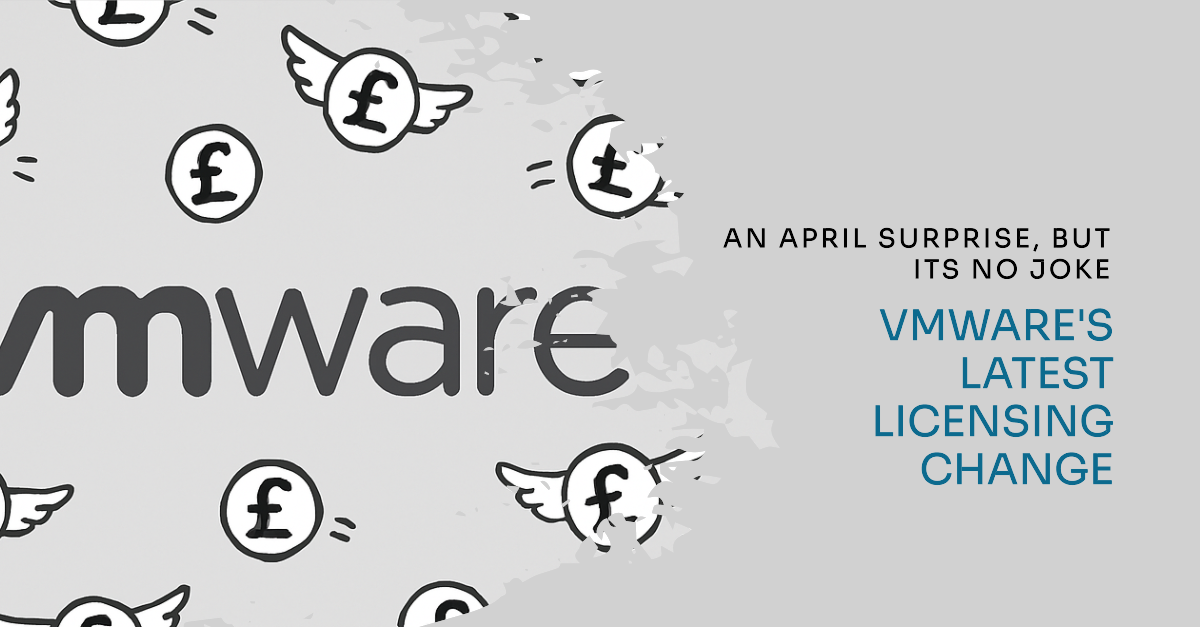VMware's Latest Licensing Change – An April Surprise, But It's No Joke
With every cloud, there’s a silver lining and maybe a migration opportunity.
Broadcom’s acquisition of VMware has been nothing short of a rollercoaster for customers, and just when you thought the ride was over, here comes another twist. As of April 10th, VMware’s licensing model is changing again, and this one will hit hard.
If you’re still running VMware, you’ll need to license a minimum of 72 cores per agreement, a huge jump from the previous 16-core requirement. If you’re already licensing over 72 cores, this won’t affect you, but if you’re below that threshold, brace for impact.
Miss a renewal? That’ll be a 20% penalty on your first-year subscription price. If this sounds like an April Fools joke, I wish it were, but it’s very real and businesses need to act fast.
Bad News for VMware, Worse News for Customers
These changes make VMware an increasingly expensive option for virtualisation. Organisations that were previously on the fence about migrating away from VMware now have a crucial decision to make. Is it worth continuing to absorb these rising costs and uncertainty, or is now the perfect time to explore other options?
For many businesses, this isn’t just a minor inconvenience it’s a major shift in how they approach IT infrastructure. Budget constraints, compliance requirements, and performance expectations all come into play. And with Broadcom’s rapid and frequent licensing changes, there’s no guarantee that this will be the last disruptive update.
VMware was once the gold standard for virtualisation, but now it seems like Broadcom is making it a financial burden rather than an enabler of efficient infrastructure. Customers locked into VMware environments may feel trapped, but in reality, this could be the best time to break free and explore modern alternatives.
Your Options: Stay, Lift, or Modernise
The good news? You have options. Broadcom’s changes may feel like a storm, but with every cloud (pun intended), there’s a silver lining. Companies that take a proactive approach to this situation could reduce costs, improve performance, and future-proof their infrastructure.
Azure VMware Solution (AVS) - If you want to stick with VMware but avoid Broadcom’s licensing headaches, AVS lets you migrate VMware workloads to Azure. You keep your existing VMware stack while taking advantage of Azure’s scalability, security, and global reach. With predictable costs and integration with Azure-native services, this could be a smooth transition for many.
Azure Virtual Machines (IaaS) - A full cloud migration may feel daunting, but for many businesses, moving workloads to Azure IaaS can cut costs and improve efficiency. Azure provides flexible VM sizing, automation, and cost optimisation tools that VMware simply can’t match. By leveraging Azure Hybrid Benefit and Reserved Instances, organisations can see substantial savings over time.
Platform Modernization (PaaS & Cloud-Native) - If you’re ready to go all-in on the cloud, modernising your apps with Azure PaaS services removes the need for traditional VMs altogether. This approach unlocks scalability, resilience, and new opportunities for innovation. Services like Azure Kubernetes Service (AKS), Azure App Service, and serverless computing allow businesses to focus on their applications rather than managing infrastructure.
Hybrid and Edge Solutions - Not every workload can move to the cloud overnight, and for some, on-premises or hybrid solutions make more sense. Azure Local HCI allows businesses to run Azure services in their own data centres while keeping workloads optimised and future-ready. This gives organisations flexibility while avoiding the uncertainty of Broadcom’s licensing changes.
Act Now – Or Pay the Price
With just days until April 10th, businesses must decide: stay locked into an increasingly costly VMware ecosystem or take this as a chance to rethink their cloud strategy.
If you’re considering Azure VMware Solution, IaaS, or full modernisation, now is the time to evaluate your options. If you’re still on the fence, consider this: the longer you wait, the more expensive staying on VMware will become. VMware’s roadmap is no longer in your control Broadcom’s changes mean unpredictable licensing costs and potential disruptions. The sooner you act, the better positioned you’ll be.
Waiting too long could mean being forced into last-minute, unplanned migrations that are costly and disruptive. Acting now gives you control over your IT future.
Proactive businesses will gain a competitive edge, while those who delay could find themselves paying far more in the long run. Instead of waiting for another licensing bombshell, this is the moment to evaluate, plan, and execute a smarter IT strategy.
This might not be the April Fools’ joke you wanted – but it could be the wake-up call your IT strategy needs.
💬 What’s your take? Are you staying with VMware, or looking at alternatives?
